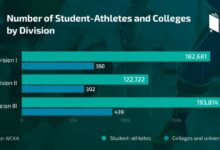Scholarship Opportunities For Athletes: A Game-Changing Guide
Scholarship opportunities for athletes sets the stage for this enthralling narrative, offering readers a glimpse into a story that is rich in detail and brimming with originality from the outset. The world of athletic scholarships is a dynamic and crucial aspect for student-athletes aiming to excel both academically and in their sports career. Let’s dive into the realm of opportunities awaiting talented athletes.
Overview of Scholarship Opportunities for Athletes
Scholarship opportunities for athletes are programs designed to provide financial assistance to student-athletes pursuing their academic and athletic goals simultaneously. These scholarships can cover tuition fees, accommodation, and other expenses related to education and sports.
These opportunities are crucial for student-athletes as they allow them to focus on their training and competitions without worrying about the financial burden of pursuing higher education. Scholarships not only support athletes in achieving their athletic dreams but also help them secure a college degree, setting a strong foundation for their future career.
Impact of Scholarships on Student-Athletes
Scholarships can have a significant impact on an athlete’s academic and athletic career. Here are some ways in which scholarships can benefit student-athletes:
- Financial Support: Scholarships provide financial assistance to cover educational expenses, allowing student-athletes to focus on their training and competitions without the stress of financial constraints.
- Opportunity for Higher Education: Scholarships enable student-athletes to pursue a college degree, opening doors to better career opportunities and personal growth beyond sports.
- Athletic Development: With financial support, student-athletes can access better training facilities, coaching, and resources to enhance their athletic skills and performance.
- Networking and Exposure: Scholarships often come with opportunities to connect with coaches, mentors, and professionals in the sports industry, providing valuable networking opportunities for student-athletes.
Types of Scholarships Available
Athletic scholarships, academic scholarships, and merit-based scholarships are some of the various types of scholarships available for athletes. Each type has its own eligibility criteria, application process, and impact on athletes’ careers.
Athletic Scholarships
Athletic scholarships are awarded based on a student’s athletic abilities and performance in a particular sport. Eligibility often requires maintaining a certain level of performance in the sport and meeting academic requirements set by the institution. The application process typically involves showcasing athletic achievements through videos, resumes, and recommendation letters. Successful athletes who have received athletic scholarships include LeBron James, Serena Williams, and Michael Phelps.
Academic Scholarships
Academic scholarships are based on a student’s academic achievements, such as high GPA, standardized test scores, and extracurricular involvement. Eligibility criteria usually emphasize academic excellence and may require maintaining a minimum GPA throughout the scholarship period. The application process often involves submitting transcripts, essays, and letters of recommendation. Notable athletes who have received academic scholarships include Myron Rolle, who played football at Florida State University while pursuing a degree in pre-med.
Merit-Based Scholarships
Merit-based scholarships consider both athletic and academic achievements, as well as other qualities like leadership, community service, and extracurricular involvement. Eligibility criteria are comprehensive and may vary depending on the scholarship provider. The application process typically involves a detailed application form, essays, and letters of recommendation. Maintaining academic performance is crucial while on a merit-based scholarship to continue receiving financial aid.
| Athletic Scholarships | Academic Scholarships | |
|---|---|---|
| Benefits | Recognition for athletic talent, financial support for sports-related expenses. | Financial support for academic pursuits, recognition for academic achievements. |
| Requirements | Maintaining athletic performance, meeting academic standards set by the institution. | High GPA, standardized test scores, extracurricular involvement. |
| Obligations | Continued athletic participation, academic progress. | Maintaining a minimum GPA, academic progress. |
NCAA Scholarships
The NCAA, or National Collegiate Athletic Association, plays a crucial role in providing scholarship opportunities for student-athletes across various sports disciplines. These scholarships are aimed at supporting talented athletes in pursuing their academic and athletic aspirations simultaneously.
NCAA Scholarship Programs
The NCAA offers a range of scholarship programs to support student-athletes in different divisions, including Division I, II, and III. These scholarships can cover tuition fees, room and board, textbooks, and other educational expenses. The main NCAA scholarship programs include:
- Athletic Scholarships: These scholarships are awarded based on athletic performance and are often offered to student-athletes who demonstrate exceptional skills in their respective sports.
- Academic Scholarships: In addition to athletic achievements, student-athletes can also qualify for academic scholarships based on their academic performance and achievements.
- Combined Scholarships: Some student-athletes may receive a combination of athletic and academic scholarships to support their educational journey.
Requirements and Regulations
It is essential for student-athletes to meet certain requirements and adhere to specific regulations to be eligible for NCAA scholarships.
- Academic Eligibility: Student-athletes must meet the academic eligibility requirements set by the NCAA to maintain their scholarships. This includes maintaining a certain GPA and making satisfactory progress towards a degree.
- Compliance with NCAA Rules: Student-athletes must comply with NCAA rules and regulations regarding amateurism, eligibility, and ethical conduct to retain their scholarships.
- Division-specific Criteria: Each division within the NCAA may have specific criteria for scholarship eligibility, including performance standards and participation requirements.
Scholarships for Specific Sports
When it comes to scholarships for athletes, there are opportunities available for a wide range of sports. Each sport may have its own set of scholarships tailored to the needs and requirements of that particular athletic discipline.
Basketball Scholarships
Basketball is a popular sport in the United States, and as a result, scholarships for basketball players are highly competitive. Many colleges and universities offer scholarships to talented basketball players who can contribute to their teams’ success both on and off the court.
Soccer Scholarships
Soccer is another sport that has a strong following and attracts a large pool of talented athletes. Scholarships for soccer players can vary in competitiveness depending on the level of play and the reputation of the college or university offering the scholarship.
Swimming Scholarships
Swimming is a sport that requires dedication and discipline, and scholarships for swimmers are available to those who excel in the pool. While swimming scholarships may not be as widely publicized as scholarships for more mainstream sports, there are still opportunities for talented swimmers to receive financial aid for their athletic abilities.
Famous Athletes Benefiting from Sports Scholarships
- Michael Jordan: The legendary basketball player received a scholarship to the University of North Carolina at Chapel Hill, where he went on to have a successful college career before entering the NBA.
- Alex Morgan: The Olympic gold medalist in soccer received a scholarship to the University of California, Berkeley, where she played collegiate soccer before becoming a professional player.
- Michael Phelps: The most decorated Olympian of all time received a scholarship to the University of Michigan, where he continued his training and development as a swimmer.
Scholarships for Female Athletes
Female athletes face unique challenges in pursuing their academic and athletic goals. To support them, various scholarships are exclusively available for female athletes. These scholarships not only provide financial assistance but also recognize their achievements in sports.
1. Women’s Sports Foundation
- Eligibility Criteria: Female athletes of all sports at high school and collegiate levels.
- Sports/Activities: All sports are eligible.
2. NCAA Women’s Leadership Symposium Scholarship
- Eligibility Criteria: Female NCAA student-athletes.
- Sports/Activities: NCAA-sanctioned sports.
3. The Billie Jean King Youth Leadership Award
- Eligibility Criteria: Female high school athletes demonstrating leadership on and off the field.
- Sports/Activities: All high school sports are eligible.
4. The Pat Summitt Foundation Scholarship
- Eligibility Criteria: Female student-athletes pursuing a degree in sports-related fields.
- Sports/Activities: All student-athletes with a passion for sports.
5. The SportsUnited Empower Women through Sports Initiative
- Eligibility Criteria: Female athletes from underprivileged backgrounds.
- Sports/Activities: Various sports programs supported by the initiative.
Gender Disparity in Sports Funding
Gender disparity in sports funding remains a significant issue in the sports industry. Despite advancements in gender equality, there is still a noticeable gap in funding allocated to male and female sports programs.
Current Status
- Research indicates that male sports programs receive significantly more funding than female sports programs in educational institutions and sports organizations.
Strategies to Increase Female Participation in Sports
Encouraging more girls and women to participate in sports is crucial for promoting gender equality and fostering a more inclusive sports community. Implementing innovative strategies can help increase female participation in sports at all levels.
Successful Initiatives
- The “Girls on the Run” program has effectively encouraged young girls to engage in physical activity and develop self-confidence through running.
- The “Women’s Sports Foundation” provides resources and support to female athletes, empowering them to excel in their respective sports.
Scholarships for Student-Athletes of Color
Student-athletes of color face unique challenges and barriers in pursuing higher education and athletic careers. Scholarships specifically designed for student-athletes of color aim to address these disparities and provide opportunities for success.
Impact of Diversity and Inclusion in Scholarship Programs
Diversity and inclusion in scholarship programs not only promote equal access to education and sports but also enrich the overall experience for all participants. By recognizing and supporting student-athletes of color, scholarship programs contribute to a more diverse and representative athletic community.
Success Stories of Student-Athletes of Color with Scholarships
There are numerous success stories of student-athletes of color who have received scholarships and excelled both academically and athletically. These individuals serve as inspiring examples of resilience, determination, and talent, breaking barriers and achieving their goals through the support of scholarship opportunities.
Academic Requirements for Scholarships
To qualify for scholarships as a student-athlete, maintaining a good academic standing is crucial. Academic performance plays a significant role in determining scholarship opportunities, as many programs require student-athletes to meet specific academic standards in addition to their athletic achievements.
Minimum GPA Requirements
- Most scholarships for student-athletes have a minimum GPA requirement that must be met to remain eligible for financial aid.
- Student-athletes are often required to maintain a certain GPA to continue receiving their scholarships.
Standardized Test Scores
- Some scholarships may also consider standardized test scores, such as the SAT or ACT, in addition to GPA.
- Athletes may need to achieve a minimum score on these tests to be eligible for certain scholarships.
Academic Progress
- Continuing eligibility for scholarships may depend on making satisfactory academic progress towards a degree.
- Student-athletes are typically required to pass a certain number of credits each semester to maintain their scholarships.
Time Management and Study Skills
- Student-athletes must balance demanding athletic schedules with academic responsibilities, requiring strong time management skills.
- Developing effective study habits and seeking academic support when needed can help student-athletes meet academic requirements.
Financial Aid Options for Athletes
Financial aid options tailored for student-athletes play a crucial role in supporting their academic and athletic pursuits. In addition to scholarships, there are alternative avenues available to help student-athletes manage their finances effectively.
Grants, Work-Study Programs, and Athletic Department Assistance
Grants, work-study programs, and athletic department assistance are additional financial aid options that student-athletes can explore to alleviate the financial burden of pursuing their education and sports simultaneously.
- Grants: These are financial awards that do not require repayment and are typically based on financial need. Student-athletes can research and apply for grants specifically designed for athletes to cover various expenses.
- Work-Study Programs: Student-athletes can participate in work-study programs to earn money while studying. These programs allow them to gain work experience and earn income to support their education and sports-related costs.
- Athletic Department Assistance: Some universities and colleges offer financial assistance through their athletic departments. This assistance can come in the form of stipends, meal plans, or other benefits to help student-athletes manage their expenses.
Comparison Chart of Financial Aid Options
Creating a detailed comparison chart can help student-athletes weigh the pros and cons of scholarships, grants, work-study programs, and athletic department assistance. This chart can outline eligibility criteria, application processes, repayment requirements, and benefits of each financial aid option.
Managing and Budgeting Financial Aid
Effective management and budgeting of financial aid are crucial for student-athletes to cover expenses beyond tuition. They can follow a step-by-step guide to allocate funds for sports equipment, travel costs, living expenses, and other necessities while ensuring financial stability throughout their academic and athletic journey.
Balancing Sports and Academic Responsibilities
Balancing sports commitments with academic responsibilities can be challenging for student-athletes. However, with the right strategies and time management skills, it is possible to excel in both areas.
Time Management and Prioritization
- Create a detailed weekly schedule that includes dedicated time for both sports training and study sessions.
- Prioritize tasks based on deadlines and importance to ensure that both academic and sports commitments are met.
- Avoid procrastination and utilize free time efficiently to stay on top of both academics and sports.
Setting Realistic Goals and Tracking Progress
- Set achievable goals for both sports and academics, breaking them down into smaller milestones for better tracking.
- Regularly monitor progress towards these goals and make necessary adjustments to stay on track.
- Celebrate small victories along the way to stay motivated and focused on achieving larger goals.
Nutrition, Rest, and Performance
- Ensure proper nutrition by eating a balanced diet that fuels both physical and mental performance.
- Prioritize adequate rest and quality sleep to allow the body to recover and perform optimally in both sports and academics.
- Stay hydrated and incorporate healthy snacks to maintain energy levels throughout the day.
Seeking Support from Coaches and Academic Advisors
- Communicate with coaches and teachers about your schedule and commitments to seek their support and understanding.
- Utilize resources provided by academic advisors to help manage workload and academic requirements effectively.
- Don’t hesitate to ask for help when needed and build a support system of peers, coaches, and teachers to enhance overall performance.
Impact of Scholarships on Athletic Programs
Scholarships play a crucial role in shaping the competitiveness and overall success of athletic programs in various ways.
Attracting Top Talent
Scholarships serve as a powerful tool in attracting top talent to sports teams. By offering scholarships to promising athletes, programs can entice skilled individuals to join their teams, thereby enhancing the overall quality and performance of the team.
Enhancing Competitiveness
Scholarships contribute significantly to the competitiveness of athletic programs. With the ability to recruit talented athletes through scholarships, programs can strengthen their rosters and compete at higher levels, increasing their chances of success in various competitions.
Long-Term Success
The long-term effects of scholarships on athletic programs are profound. By consistently awarding scholarships to deserving athletes, programs can build a legacy of excellence, attract more top talent in the future, and maintain a high level of competitiveness year after year.
Mentorship and Support for Scholarship Recipients
Mentorship plays a crucial role in the success of scholarship recipients, providing guidance and support as they navigate both their academic and athletic commitments.
Importance of Mentorship Programs
Mentorship programs are essential for scholarship recipients as they offer personalized guidance, advice, and support to help student-athletes thrive in both their academic and athletic pursuits.
- Mentors serve as role models, offering valuable insights and wisdom gained from their own experiences.
- They help scholarship recipients set goals, develop time management skills, and overcome challenges they may face.
- Through mentorship, student-athletes can receive emotional support, motivation, and encouragement to reach their full potential.
Role of Mentors in Guiding Student-Athletes
Mentors act as a guiding force for scholarship recipients, providing them with the necessary tools and resources to excel in their academic and athletic endeavors.
- They assist student-athletes in creating balanced schedules that prioritize both their studies and training.
- Mentors help scholarship recipients identify their strengths and weaknesses, offering constructive feedback to aid in their personal and professional growth.
- They foster a supportive and nurturing environment that empowers student-athletes to achieve success on and off the field.
Examples of Mentorship Programs
Several mentorship programs have positively impacted scholarship recipients by providing them with mentorship opportunities tailored to their specific needs and goals.
- The NCAA Student-Athlete Mentor Program pairs student-athletes with experienced mentors who offer guidance and support throughout their college careers.
- The Women’s Sports Foundation Athlete-to-Athlete Program connects female athletes with mentors who help them navigate the challenges of balancing academics and sports.
Qualities of a Successful Mentor
Successful mentors possess certain qualities that enable them to effectively support scholarship recipients in their academic and athletic pursuits.
- Effective communication skills to establish a strong rapport with student-athletes.
- Empathy and understanding to provide emotional support and guidance when needed.
- Knowledge and experience in the academic and athletic fields to offer valuable insights and advice.
Structured Mentorship Program vs. Informal Mentorship Arrangements
A structured mentorship program offers numerous benefits compared to informal mentorship arrangements for scholarship recipients.
| Structured Mentorship Program | Informal Mentorship Arrangements |
|---|---|
| Provides a formal framework for mentorship interactions. | May lack consistency and structure in mentorship support. |
| Offers access to resources and support systems within the program. | Relies on individual efforts to seek out mentorship opportunities. |
| Encourages regular communication and goal-setting between mentors and mentees. | Depends on the availability and commitment of mentors in informal settings. |
Scholarships and Professional Sports Careers
Scholarships can be a crucial stepping stone for student-athletes looking to pursue professional sports careers. These opportunities not only provide financial support for education but also offer a platform to showcase athletic talents and skills to potential scouts and recruiters. The relationship between collegiate scholarships and professional sports opportunities is often intertwined, with many athletes leveraging their college experience to springboard into successful professional careers in their respective sports.
Transitioning from Scholarship Recipients to Successful Professionals
- One notable example is former University of North Carolina basketball player Michael Jordan, who went on to become one of the greatest NBA players of all time after receiving a scholarship to play college basketball.
- Another example is Serena Williams, who received a tennis scholarship to attend the University of California, Los Angeles (UCLA) before becoming a dominant force in professional tennis, winning numerous Grand Slam titles.
- Patrick Mahomes, a former college football player at Texas Tech University, transitioned from being a scholarship recipient to becoming the Super Bowl-winning quarterback for the Kansas City Chiefs.
Challenges Faced by Student-Athletes Seeking Scholarships
Student-athletes face various challenges when seeking scholarships to support their academic and athletic pursuits. These challenges often revolve around meeting specific academic requirements, balancing sports commitments with academic responsibilities, and managing time effectively.
Academic Requirements for Scholarships
Student-athletes must maintain a certain GPA, complete required courses, and achieve standardized test scores to be eligible for scholarships. Meeting these academic requirements can be challenging, especially when juggling demanding sports schedules and training sessions.
- Ensure a minimum GPA is maintained
- Complete necessary core courses
- Achieve required standardized test scores
Importance of Balancing Sports and Academics
Maintaining a balance between sports commitments and academic responsibilities is crucial for student-athletes. Failing to manage time effectively can lead to academic struggles, performance issues in sports, and ultimately impact scholarship opportunities.
- Prioritize tasks and create a schedule
- Utilize study halls and academic support services
- Communicate with coaches and teachers about workload
Successful Time Management Strategies
Student-athletes can implement various time management strategies to navigate the challenges of balancing sports and academics successfully. By staying organized, setting priorities, and seeking support when needed, student-athletes can optimize their performance both on the field and in the classroom.
- Use a planner or digital calendar to track assignments and practices
- Break tasks into smaller, manageable chunks
- Establish a routine that includes dedicated study time
Ethical Considerations in Scholarship Opportunities for Athletes
When it comes to scholarship opportunities for athletes, ethical considerations play a crucial role in ensuring fairness, transparency, and integrity in the selection process. Upholding ethical standards is essential to maintain the credibility and reputation of scholarship programs, as well as to provide equal opportunities to all deserving student-athletes.
Fair Distribution and Transparency
It is important to establish clear criteria and guidelines for awarding scholarships to athletes to ensure fair distribution. Transparency in the selection process helps prevent favoritism or bias and promotes equal chances for all student-athletes.
Importance of Upholding Ethical Standards
Adhering to ethical standards not only promotes trust and credibility in scholarship programs but also instills a sense of integrity and accountability in the selection committee. It is essential to prioritize ethical considerations to maintain the legitimacy of scholarships for athletes.
Ensuring Equity and Integrity
To ensure equity and integrity in the allocation of scholarships, measures such as blind selection processes, diverse selection committees, and regular reviews of selection criteria can be implemented. These strategies help mitigate potential biases and ensure a fair and transparent scholarship selection process.
Examples of Ethical Dilemmas
Examples of ethical dilemmas in awarding scholarships to athletes may include conflicts of interest, preferential treatment, or lack of transparency in the selection criteria. Addressing these dilemmas requires a proactive approach to uphold ethical standards and maintain the credibility of scholarship programs.
Preventing Favoritism and Bias
To prevent favoritism or bias in the selection of student-athletes for scholarships, establishing clear evaluation criteria, rotating selection committee members, and implementing regular training on ethical standards can help maintain fairness and transparency in the scholarship allocation process.
Closing Summary
As we conclude this exploration of scholarship opportunities for athletes, it’s evident that these avenues can truly transform the lives of student-athletes, providing them with the necessary support to pursue their dreams. With a myriad of scholarships available, the future looks bright for those dedicated to balancing their academic and athletic pursuits.









